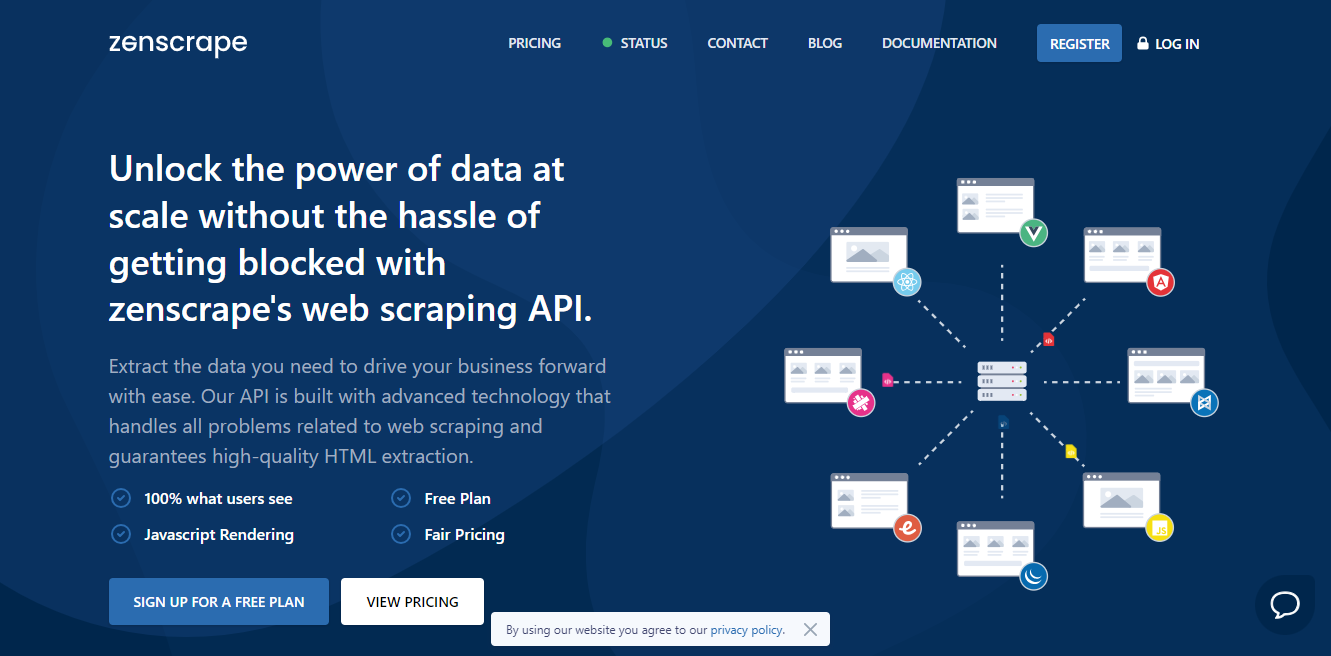
Web scraping has emerged as an essential tool for businesses and researchers to gather valuable data from the vast expanse of the internet. However, this process becomes challenging due to the constant efforts to prevent scraping by websites using various security measures. So, we need to use proper web scraping tools. This is where proxy servers have become an indispensable resource. Two popular options are sticky and rotating session proxies.
In this blog, we’ll explore the key differences between these web scraping tools and determine which one might be the best fit for your web scraping needs. Sticky proxies, also known as static proxies, are a type of proxy that assigns a single IP address to a user for an extended period. Once it connects to a specific IP, the user’s requests will consistently use that same IP throughout the entire scraping session.
On the other hand, rotating proxies, also known as dynamic proxies, regularly change the assigned IP address for each request. As we delve into the use cases, pros, and cons of both sticky and rotating proxies, we aim to equip you with the knowledge to make an informed decision. So, let’s dive in and explore the intriguing world of web scraping proxies!
What is a Sticky Proxy in Web Scraping?
A sticky port proxy functions as a server that maintains the same IP address for a predetermined period during a session, typically spanning several seconds or minutes. Once this interval elapses, the IP address changes and this process is referred to as a sticky session.
Confusion often arises between proxies with sticky sessions and static proxies. In the case of static proxies, the assigned IP address can remain valid for an extended period. It can remain valid even up to several months. This extended duration is made possible through ISPs and dedicated datacenter proxies. They can secure an IP address for prolonged use.
However, residential proxies rely on actual physical users being online to share their IPs. Moreover, it sets a limitation on the duration of the sticky session. Consequently, certain proxy providers may enforce compulsory IP rotation after a specific time, even if they initially promise extended proxy sessions.
Use Cases
Sticky proxies offer practical use cases in different scenarios:
Social media accounts
Managing multiple accounts from a single device becomes effortless with sticky proxies. By setting up specific timings, users can easily access and log in to different accounts. Hence, ensuring smooth operations. Daily access to the proxy provider is essential for uninterrupted service. It is important, especially when dealing with market disruptors like 991.re.
Online sneaker shopping
Sticky proxies prove invaluable for purchasing limited-edition sneakers on sites that require credentials for each transaction. Configuring a bot to enter necessary information before switching to another IP for the next purchase streamlines the buying process.
Pros
Sticky proxies have several benefits, such as:
- Efficiently handling social media accounts.
- Monitoring e-commerce deals in various regions.
- Conducting market research effectively.
- Enabling extended browsing sessions.
- Minimizing data exchange for enhanced privacy.
Cons
One drawback of utilizing sticky proxies is their lack of a dynamic IP address pool. Consequently, intelligent bots can easily detect unusual usage patterns. Hence, leading to the blacklisting of the IP address and disrupting web scraping activities.
What is a Rotating Proxy in Web Scraping?
A rotating proxy tool offers a diverse range of IP addresses without requiring a proxy rotator. Unlike sticky proxies, rotating proxies automatically generate a fresh and unique IP address for each request or browsing session.
By connecting to the target site through different whitelisted IP ranges, rotating proxies make it challenging for the host server to identify any suspicious behavior. Developers can customize commands within rotating proxies to dictate their connections to servers in various geographical locations.
This flexibility and anonymity make rotating proxies a powerful choice for web scraping and other online activities.
Use Cases
Rotating proxies find valuable use cases in diverse fields:
E-commerce data extraction
For e-stores and marketplaces seeking a competitive edge, rotating proxies enable anonymous data collection from competitors. With different IPs on each request, crucial information on pricing, special deals, and more can be gathered.
Data collection on airfares
Airfare aggregators and bargain hunters benefit from rotating proxies with IPs from various locations. Dynamic pricing systems of airlines often depend on the requester’s geographic location. Hence, allowing users to secure the best deals by rotating their IPs.
Search engine optimization monitoring
In the ever-important world of SEO, businesses gain an advantage by monitoring keywords and their SERP rankings. Rotating IPs for multiple requests from different locations unveils insights to enhance their position on potential customers’ search result pages.
Pros
- Monitoring SEO.
- Web scraping.
- Sessions.
- Proxy variety.
- Generating leads.
- Anonymity.
- E-commerce trend analysis.
- Navigate Cookie Tracking.
Cons
A disadvantage of using a rotating proxy is that users may encounter JavaScript challenges imposed by Bot detection systems. Additionally, certain rotating proxy providers offer a restricted pool of IP addresses. Hence, increasing the likelihood of being blocked during the process.
Sticky vs Rotating Proxies: Which Should I Use?
Clearing up the confusion between sticky and rotating proxies is essential, as the choice depends on the specific task at hand. If your goal is to scrape e-commerce websites, rotating proxies are ideal. On the other hand, sticky proxies are more suitable for purchasing from stores in different regions.
For large-scale operations, rotating proxies are necessary to handle the volume. On the other hand, a lighter social media scraping task can be accomplished effectively with a sticky proxy.
Understanding the nuances of each proxy type empowers users to make the right selection based on their distinct requirements.
Which Proxies Does Zenscrape Provide?
Zenscrape provides both rotating and sticky proxies for web scraping purposes. These proxies allow users to access and extract data from websites while ensuring anonymity and preventing IP blocks. Here is why you should choose it:
Choosing Zenscrape offers several compelling reasons for your web scraping needs:
- Zenscrape provides a robust and reliable web scraping solution. Hence, ensuring smooth data extraction from various websites.
- With a selection of rotating and sticky proxies, Zenscrape offers versatile options to suit different scraping tasks and avoid IP blocks.
- Zenscrape’s user-friendly interface and API make it accessible for both beginners and experienced developers.
- The platform offers extensive documentation and customer support. Hence, assisting users in setting up and optimizing their scraping processes.
- Zenscrape prioritizes fast response times, allowing users to retrieve data quickly and efficiently.
- Zenscrape ensures high data accuracy, providing reliable and valuable information for your projects.
Conclusion
The debate between sticky and rotating session proxies has shed light on the importance of choosing the right tool for web scraping endeavors. Both proxy types offer unique advantages and drawbacks that cater to different scraping requirements. Sticky proxies prove valuable for managing social media accounts, conducting market research, and enabling extended browsing sessions.
On the other hand, rotating proxies, equipped with a diverse pool of IP addresses, excel at scraping e-commerce websites and evading bot detection systems. Ultimately, the best proxy for web scraping hinges on the nature and scale of the project. For larger, data-intensive tasks, rotating proxies are indispensable, while smaller and lighter scraping jobs can thrive with sticky proxies.
FAQs
What Is Web Scraping?
Web scraping is the automated process of extracting data from websites. Hence, enabling users to gather and analyze information for various purposes.
Can You Get Banned for Web Scraping?
Web scraping can lead to getting banned from websites if done improperly or against the site’s terms of service.
What Is an Example of Web Scraping?
An example of web scraping is extracting product information, prices, and reviews from an e-commerce website to gather competitive insights.
Is Web Scraping Easy?
Web scraping can be both easy and challenging, depending on the complexity of the website, data extraction requirements, and familiarity with scraping tools.
Unlock the full potential of web scraping with Zenscrape – Try it now!







